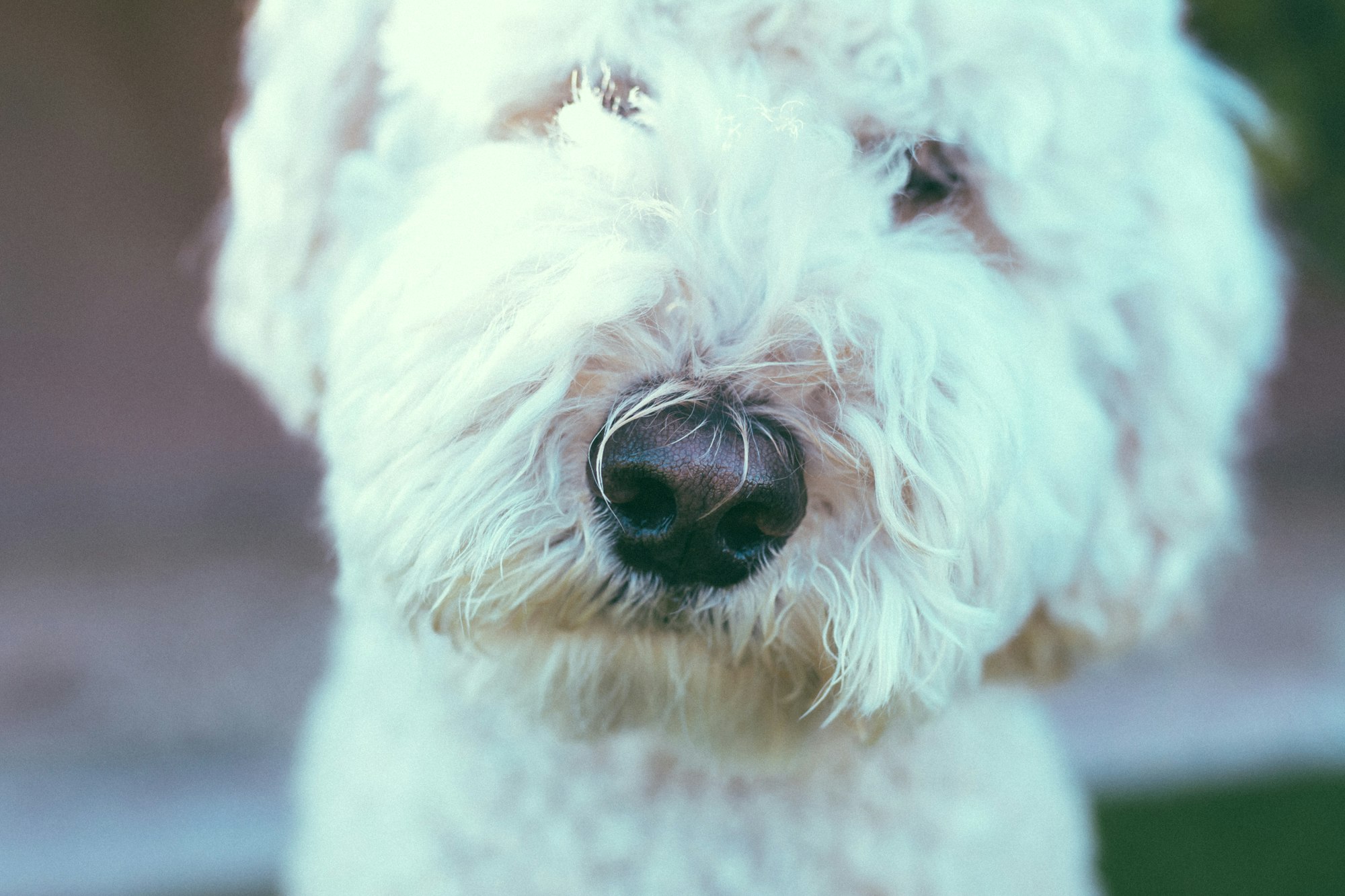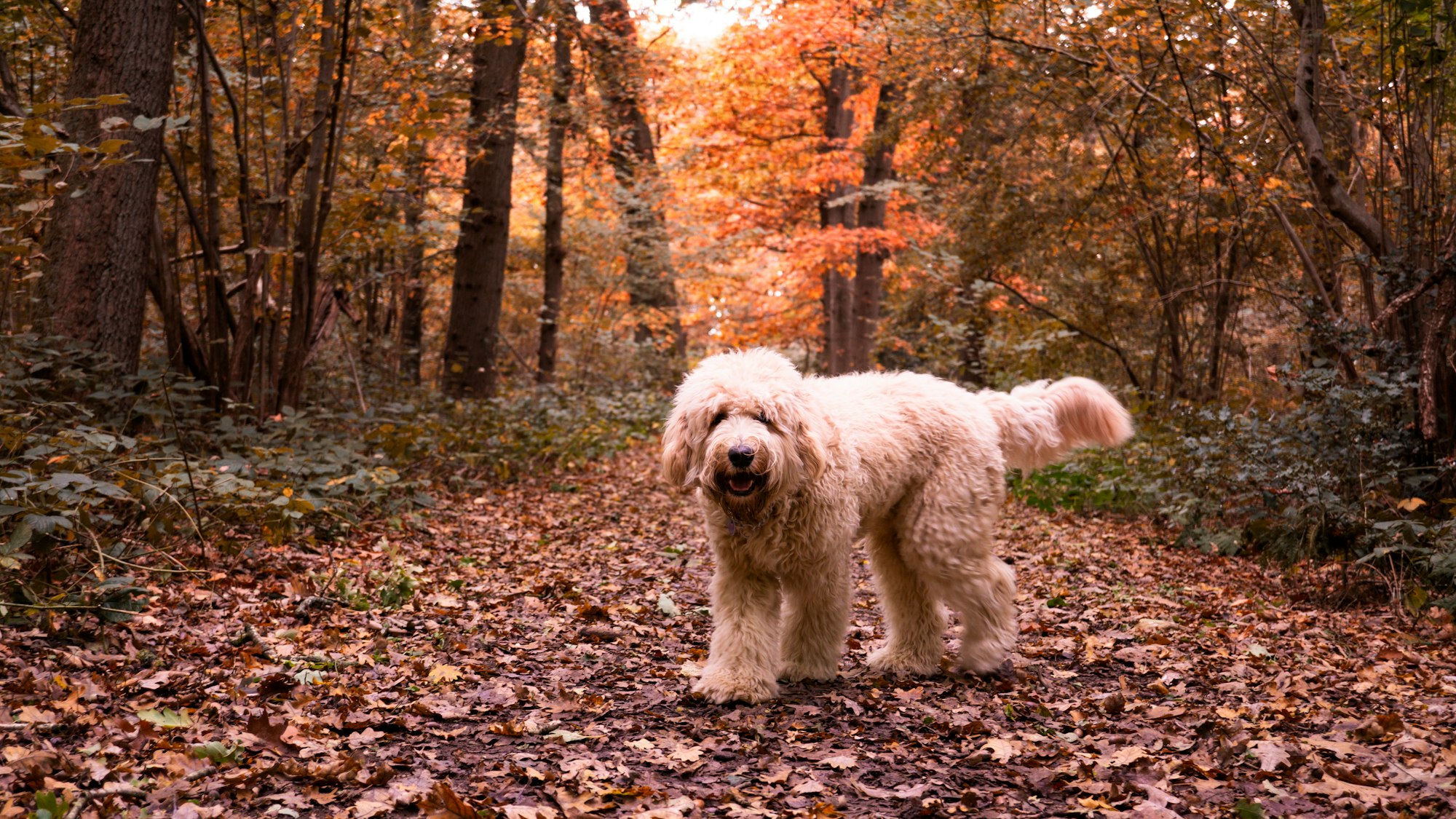A White Goldendoodle dog is sure to bring some extra fun and happiness into your life. But before deciding whether you would like to join the Goldendoodle club, read on for everything you need to know about this breed.
Here we'll discuss their personality, appearance, health concerns, grooming requirements and activity level - so that no matter what kind of lifestyle your household leads – you can be confident in knowing if the white Goldendoodle will be right for your lifestyle and home.
What is a White Goldendoodle?
The white Goldendoodle is a hybrid breed of dog that is a combination of a purebred Golden Retriever and a purebred Poodle. These dogs typically have expressive, friendly faces and soft white coats. They are great family pets as they are loyal, very intelligent, and have easygoing personalities.
Goldendoodles are also very social animals that love to spend time with their owners and families. And if you’re someone looking to minimize your time cleaning up fur, they do not shed much at all, also making them a good choice for those with allergies. The white Goldendoodle is truly the perfect pet for many people.

Is The White Goldendoodle Rare?
The white Goldendoodle is definitely a unique breed, and for that reason, they are actually considered quite rare. Golden Retrievers typically have either black or golden coats, so they do not possess the two recessive genes needed to produce a white coat. As a result, white Goldendoodles can also be hard to find as F1 Goldendoodle puppies.
Despite this, there are still many people who would like a white Goldendoodle pet. Therefore, finding one of these dogs can be quite difficult as trustworthy breeders are few and far between. As such, if you do decide on getting one of these beautiful dogs, be prepared to put in some time researching reputable breeders.
White Goldendoodle vs Cream Goldendoodles: Is There A Difference?
Yes, there is a difference between the two. While white Goldendoodles and cream Goldendoodles may look similar at a glance, there are some interesting differences between them.
White Goldendoodles have a soft, wavy coat that is often whiter than cream. Cream Goldendoodles have a warmer-toned light coat with hints of apricot or beige.
The white Goldendoodle’s faces often have unique dark markings around their eyes, nose, mouth and ears. In contrast, the cream Goldendoodle's fur stays an even cream tone around its eyes, nose and mouth.
Overall, it is much easier to find a cream-coat Goldendoodle than their white counterparts.

White Goldendoodle Coat Types
Let's go over all the details about white Goldendoodle coat types - how they differ, which type is best for you and what grooming needs to be done to keep your pup looking its best. Whether you already own a white Goldendoodle or are considering adopting one soon, read on to learn more about these special pooches.
The Curly White Coat Goldendoodle
The curly white coat Goldendoodle is known for its signature curly white coat. Its thick, luxurious coat requires a bit more maintenance than other coat types. This is because the curls can become matted easily so they will require daily brushing to avoid this. A little less popular than the wavy white coat, if you love curls and have the time, they are still worth it for those looking for an eye-catching pup with an allergy-friendly coat.
The Wavy White Coat Goldendoodle
The more popular of the two, the wavy coat of a white Goldendoodle varies in length and usually doesn’t require as much maintenance since it is easier to groom than a curly coat. Brushing your pup regularly helps keep its coat smooth, soft, and healthy. This is a great option for those with busy lifestyles who may find maintaining the curly coat a bit of a challenge.
White Goldendoodles Temperament
White Goldendoodles are an incredibly affectionate and friendly breed of dog. They have a reputation for being gentle, loving, and social creatures that make great family pets. White Goldendoodles love to please their owners and will go out of their way to do so.
They are extremely intelligent dogs who need plenty of mental stimulation to keep them entertained. White Goldendoodles also tend to be high-energy dogs, needing an adequate amount of exercise and playtime. While they can be rambunctious as puppies, with proper training and socialization white Goldendoodles will grow up to be well-mannered, obedient canine companions that get along nicely with other animals and people alike.
White Goldendoodle Appearance
Have you ever wondered why the white Goldendoodle doesn’t appear to look anything like its Golden Retriever parent? Although they take on many traits of the Golden Retriever, when it comes to appearance they resemble more their Poodle parent.
The genetics that gives the white Goldendoodle their white coat comes from the Poodle so this is why they appear more Poodle than Retriever.
The goldendoodle also comes in other colors if white is not your preferred color. Some of the other colors that exist are black, chocolate, apricot and red.
White Goldendoodle Sizes
Before you bring home your own white Goldendoodle, it's important to understand the different sizes of this breed so you can make sure you are getting the pup that best fits your lifestyle. Mixed breeds have quite a range of sizes due to the differences between their parent breeds. Read on to explore these size variations.
Teacup white Goldendoodle: The teacup white Goldendoodle is the smallest variation that typically weighs around 7 to 10 lbs when fully grown. They stand on average around 8 to 13 inches in height. However, be aware that teacup-sized dogs can be more prone to health issues due to their smaller stature so it’s important to be extra vigilant about monitoring their health if you choose this size white Goldendoodle.
Toy (Petite) white Goldendoodle: The toy (petite) white Goldendoodle typically weighs between 10-25 lbs when fully grown and stands at around 10 to 16 inches making them slightly bigger than the teacup variety but they are still considered “toy” sized dogs.
Miniature white Goldendoodle: Miniature Goldendoodles are a mix of a miniature Poodle and a Golden Retriever. They typically weigh between 15-30 lbs and can reach a height of 15 to 17 inches when fully grown making them bigger than both the toy (petite) and micro variations but still considered “miniature” sized dogs.
Medium or Standard white Goldendoodle: The medium or standard white Goldendoodles typically weigh between 30-50 lbs and have an average height that ranges from 18 to 26 inches. They are the largest of the white Goldendoodle variations listed above but are still considered “medium/standard” sized dogs.
Do White Goldendoodles Shed A Lot?
No, white Goldendoodles do not shed very much. While all dogs shed some hair naturally regardless of breed, white Goldendoodles tend to be low shedders compared to other breeds. This is because they inherit their Poodle parents’ genetic coat traits.
Common White Goldendoodle Health Problems
Like all breeds, there are certain health concerns that owners should be aware of. Here are the most common health issues associated with white Goldendoodles.
- Patellar Luxation is a common problem among white Goldendoodles, as well as other small to medium-sized breeds. It occurs when the kneecap slips out of its groove in the leg bones and causes pain and lameness in the affected leg. It can usually be treated with rest or surgery depending on the severity of the case.
- Hip and elbow dysplasia are also genetic conditions that affect white Goldendoodles. These conditions occur when the hip or elbow joint fails to develop properly, resulting in pain and difficulty walking or running. Treatment will depend on the extent of the damage but may include physical therapy, medication or surgery.
- Arthritis is another condition that can affect white Goldendoodles due to their larger size and weight strain on their joints as they age. The most common symptom is stiffness in the joints, which makes it difficult for your pup to move around normally. A healthy diet and regular exercise can help prevent arthritis from developing in your pet as they age.
- Atopic dermatitis is a skin condition that affects many dogs, including white Goldendoodles due to their thick coats which can trap moisture near their skin, leading to itching and irritation. Allergies can also contribute to this condition, so it is important to have your pup tested for any allergies they might have before treating them for atopic dermatitis.
- Cochleosaccular deafness is a hereditary condition found in some breeds of dogs, including white Goldendoodles, which results in partial or complete deafness in one or both ears due to a malformation of their inner ear structures. Proper genetic testing needs to be done to clear your pup if you plan to breed them, as this condition can be passed down from generation to generation if left unchecked.
- Von Willebrand disease is a genetic disorder found in some animals, including white Goldendoodles that prevents blood from clotting properly due to a lack of certain proteins needed for clotting processes known as vWF (von Willebrand factor). This disorder can cause excessive bleeding during surgery or injuries, so it’s important that your pup get tested before any procedures take place so that proper precautions can be taken if needed.
- Cataracts are another potential issue with white Goldendoodles which cause cloudy vision due to the build-up of protein on their eye lenses over time which blocks light from entering their eyes, making things appear blurred or fuzzy looking up close, or far away.
- Allergies are also commonly found among Goldendoodle breeds as a result of having thick coats that can trap allergens close to their skin, causing itching, redness, hives, and sneezing.
- Cranial cruciate ligament ruptures are a very serious condition where one of two ligaments located inside knee joints rupture, resulting in extreme pain and swelling along with difficulty walking, jumping, and running.
Good breeding practices combined with a healthy diet and exercise plus regular vet visits will go a long way towards helping keep a white Goldendoodle well and happy throughout its life.
The shades of light-colored Goldendoodle
Light-colored Goldendoodles come in a variety of shades, from soft cream to vibrant beige. Cream Goldendoodles have a pale golden coat that is almost white, while the beiges range from a light honey color to deep rich colors resembling cappuccino.
There are also many subtle tones and shades in between, so you can find a hue of goldendoodle that perfectly suits your personality and taste. These include apricot and champagne, to name a few.

Where do Goldendoodles get their coloring?
Even though Goldendoodles have a variety of coat colors, they are characterized by their light-colored coats. The Golden Retriever has a luxurious golden or cream-colored coat, while the Poodle has several shades of blonde that range from white to apricot and even silver. When these two breeds are brought together, they create a lovely combination of light colors that gives Goldendoodles their iconic look.
Coat colors may transition as a Goldendoodle grows
Cream, champagne and beige are the most common coat colors in Goldendoodles, but they can also transition differently as the pup matures. As puppies, many Goldendoodles typically have a creamy or light beige coat that darkens over time until they reach full maturity at around one and a half to two years of age.
During the transition period, their coats may take on more of an apricot hue, before settling into a more gold-toned shade. The range of shades along this spectrum can vary from light cream to rich golden-brown tones, depending on the mix of genetics inherited from both parents.
Final Thoughts
All in all, the white Goldendoodle surely lives up to the hype of being an amazing companion and lovely family pet. From their intelligence to their kind disposition, these dogs are sure to bring much joy into your home.
If you're looking for a loving and loyal pooch, look no further than the white Goldendoodle - they're truly something special.
For additional pet-parenting tips, head over to TryFi.com's Off Leash blog.
And don't forget to check out TryFi's innovative Fi Dog Collar, which offers GPS tracking, activity monitoring, and escape alerts to keep your furry friend safe. Try the Fi Dog Collar today!

